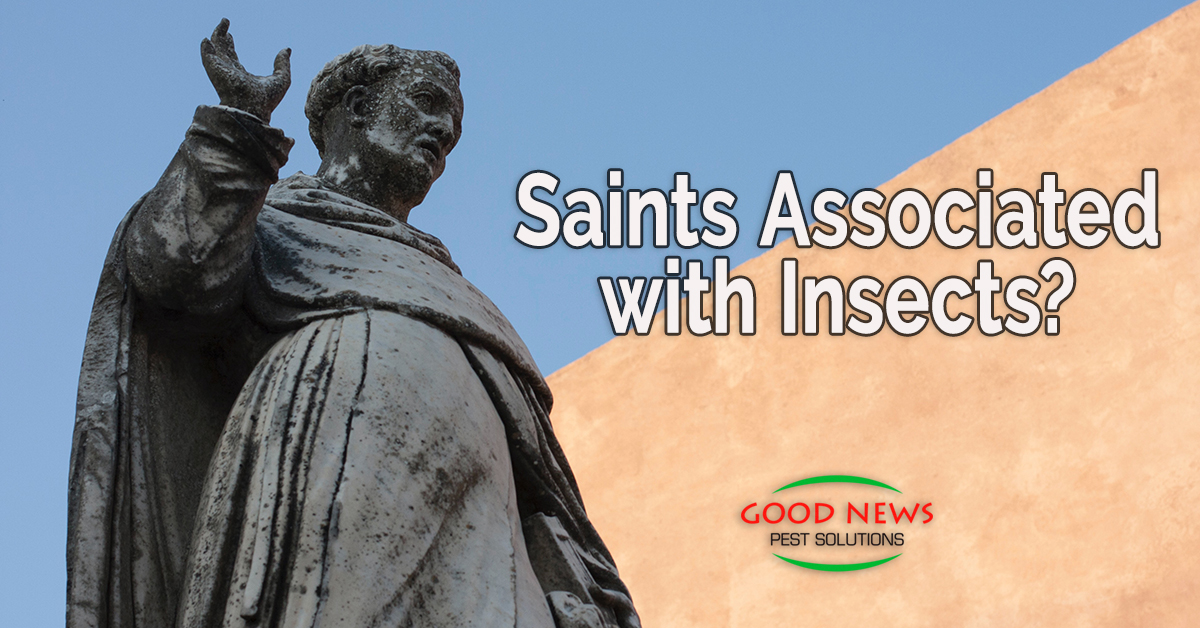
Saints Associated with Insects?
It shouldn’t be too much of a surprise to most folks that bees are mentioned in the Bible. After all, the Holy Land that God had Abraham lead the Hebrew people to is often referred to as a land of milk and honey. And of course, Jesus’ cousin, John the Baptist, is described in the New Testament as eating locusts and honey.
Honey in the Bible is connected to food, health, prosperity, enjoyment of life, even the bond of marriage.
So you could say that bees and honey are very important to both God in heaven and his people on the earth. The early church thought so too. While the Catholic church has patron saints for just about anything you can think of, there are no less than eight such saints who are considered the official saint of bees and/or beekeepers.
Food of the Gods
The word ambrosia means delicious or sweet smelling. In ancient Greek mythology, ambrosia was also the magical fruit of the gods – Homer mentions in The Iliad that they even bathed in it. We’re not sure why Ambrose Aurelius was saddled with such a name, but he wore it well.
Eventually becoming the Bishop of Milan, Ambrose was known as the ‘honey tongued’ preacher. Some even attributed it to a childhood incident where he survived having a swarm of bees on his face. When they flew off they left a single drop of honey.
As a Saint, Ambrose is typically pictured holding a beehive.
Sweet Like Candy
The second most popular man associated with bees and beekeepers is probably known even more for his other saintly duties – and the holiday that bears his name.
A roman priest and physician, one of the two men considered to be the “original” St. Valentine suffered martyrdom during the persecution of Christians by the emperor Claudius II Gothicus around 270 AD. Or perhaps Valentine was the Bishop of Terni who secretly married couples to help the men avoid going to battle.
Regardless of which – if either or maybe both – of the accounts you believe, no one doubts that St. Valentine is associated with love. But he’s also tasked with making sure the honey stays sweet and protecting beekeepers. That’s how the Eastern European peoples of Romania, Ukraine and others remember him.
The Other Contenders
In 530 AD, Benedict of Nursia founded a monastery at Monte Cassino between Rome and Naples. It was the first of 12 such abbeys he would establish, placing 12 monks in each and instructing them on three vows: stability, fidelity to the monastic way of life, and obedience. These would become known as the Benedictine Rule. One of the ways the monks practiced stability was in raising bees, linking St. Benedict to bees forever. To this day, French beekeepers will attach a St. Benedict medal to their hives and his feast day is celebrated with the blessing of the beehives.
St. Modomnock trained as a monastery beekeeper in Wales under St. David. He did such a good job that when he returned to his native Ireland, the bees followed him, first on the mast of the ship and then settling into the Irish countryside. He’s said to be responsible for bringing bees to Eire.
In Celtic tradition, bees are believed to be the form a soul takes when it leaves a body. St. Abagail Gobnait raised bees in her abbess and supposedly sent bees after thieves who tried to steal the community’s livestock. She is also believed to be the first person to use them to treat medical ailments, saving the people of Ballyvourney from the plague.
Two other monks turned saints are also associated with bees and medicine. St. Bernard of Clairvaux in France and St Kharlamii of Asia Minor in Bulgaria both employed the healing benefits of honey on their respective communities.
Finally, the weirdest one – St. Bartholomew, one of Jesus’ original twelve apostles, is said to be responsible for a great many things. He took the Gospel to India, Armenia, and Azerbaijan. He is often seen as the blue-collar saint associated with making shoes, leather, books, and gloves. He is also associated with farmers and is called the patron saint of mead makers. A blessed man indeed.
While many church saints have fallen into obscurity over the years, there is now a chance for you to be a modern-day patron saint of bees. As we’ve mentioned before, bees are endangered, declining by 89% in recent years. Without bees, our agriculture and very economic system would collapse in just a short time.
But you can help. Protect bees when you can. Consider raising honeybees to help with pollination; donate to companies who restock depleted bee populations like after last years’ Hurricane Ian. And you can support companies like ours who provide green pest control solutions rather than using harsh chemical pesticides that can also harm bees.
For more details, please give us a call.
« Back to Blog
Proudly Serving
Sun City Center, Ruskin, Palmetto, Parrish, Ellenton, Bradenton, Anna Maria, Holmes Beach, Bradenton Beach, Longboat Key, Lakewood Ranch, University Park, Myakka City, Sarasota, Siesta Key, Osprey, Nokomis, Casey Key, Venice, Englewood, North Port, Port Charlotte, Punta Gorda, Arcadia
Things You Can Do
Pay Your Bill Online
Leave Us a Review
Request a Free* Termite Inspection
Stop Mosquito Bites
Get Rid of Rodents
Get a Termite Damage Warranty
Get Pest Control for Your Attic
Get Pest Control for Your Business Request Prayer
Corporate Address
1080 Enterprise Court, Ste A
North Venice, FL 34275
Call Now: (941) 412-9610
Text: (941) 412-9610
Fax: (941) 412-0080
